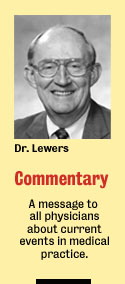
Home
|
LISTINGS |
2000 by date
2000 by region
2000 by health plan
2000 news briefs
2000 columns
2000 letters
Special coverage
Reader opinion
Past years
Search
|
SERVICES |
E-mail alert
Print edition
Staff directory
Author bios
Advertising
Permissions
AMNews FAQ
Contact us

OPINION
AMA's fight for patients' rights is only the beginning
By D. Ted Lewers, MD, chair of the AMA Board of Trustees. Oct. 2, 2000.
As you read this, the fate of the patients' bill of rights might very well have been determined. But enacted or not, the legislation is not dead.
Not when 87% of voters say it's time for Congress to pass a real bill.
Not when 67 patient, physician and health care provider organizations can band together in a Patient Access Coalition to make it happen.
There is too much momentum -- not to enact partisan legislation but to enact patient legislation.
And in the final weeks of the 106th Congress, events moved swiftly.
Once we won in the House, once the Norwood-Dingell-Ganske legislation passed so overwhelmingly, we saw it stalemated in a Senate-House conference committee.
We came within one vote of passage of a Senate version of that bill. But we couldn't move forward.
Just days ago, we tried yet another route: passage of a compromise bill.
I was quoted in The New York Times not long ago as saying, "The AMA strongly supports the revised version of the bipartisan patients' bill of rights. It covers all Americans and holds health plans accountable for actions that harm patients."
Not everything we wanted, but a healthy start.
And we've launched an exhaustive persuasion campaign.
AMA's National House Call visited key states to bring the issues to the voters in states whose senators might provide the single swing vote to allow passage. We have earned genuine support. We played it straight. We brought our message to the people, urging them to hold their senators accountable.
I unveiled a television spot urging Americans to tell their senators to stand up for patients' rights, to let America's doctors make health care decisions.
AMA leadership and our Washington team used every maneuver in the book to break the jam, to create support, to enforce the will of virtually nine out of 10 voters.
Finally, as an act of goodwill and smart politics, we participated in developing revised legislation, a compromise approach, a negotiated resolution of differences.
There were areas of legislation where we could compromise in good faith. On the issue itself, however, there is no compromising.
We've used up all the wiggle room at our command.
We've demonstrated good faith.
We've played by the rules.
We've told our story time and time again to anyone who would listen, to anyone interested in learning what 87% of Americans have on their minds.
As you read this column, as Congress adjourns, 435 representatives and one of every three senators complete their re-election campaigns.
For six years, we have been telling each and every one of them of the concerns of Americans and the AMA proposals for serving the taxpayers and voters of America with better health care options.
You know our reasoning and you know of the broad range of communications, confrontations and grassroots efforts we've launched to deliver our messages. But did you ever think of the enormous intellectual capital we've amassed as the result of our patients' bill of rights experience?
In addition to bringing home the message, we have brought back a new level of respect and appreciation from Americans everywhere.
We've made strong, positive links into the major news media -- from the Washington Post, Associated Press, The New York Times and the Wall Street Journal to CNN and National Public Radio. We've created channels through which to communicate other issues and AMA positions.
We've established ourselves as credible news sources, what National Public Radio's "Morning Edition" described as pulling no punches, using sharpened rhetoric and making its points.
We've capitalized on the enormous power of grassroots campaigning. Grassroots technology -- the nuts and bolts of activism literally in your hands -- proved effective and will be equally effective in the future.
AMA's National House Call technique has proven a winner. Never engaging in partisanship, never endorsing or attacking any candidate, it's become a powerful vehicle for delivering issues-related copy points.
Now, to reprise the old E.F. Hutton commercial, when the AMA speaks, America listens.
America's voters, taxpayers and patients, themselves.
America's lawmakers.
America's influential media.
As one observer noted, there's a whole new attitude at the AMA, a whole new activism.
But he was only half right.
Yes, it's true, we've created a massive engine of persuasion and communication that is having results.
But that engine was never intended for a single, one-way trip. From the get-go, we have committed ourselves to stay the course, to persevere.
A whole new activism zeroed in on crucial issues and persevering until Congress gets it right.
The health care issues -- not just the patients' bill of rights -- are too important to be left to bumbling bureaucrats and bottom-line-oriented insurance processors.
Tell me what you think. E-mail me (ted_lewers@ama-assn.org).
Dr. Lewers of Easton, Md., is a nephrologist and internist.



|
Write a |
Archives:
![]() Chair archive 2000
Chair archive 2000 ![]() Chair archive 2001
Chair archive 2001